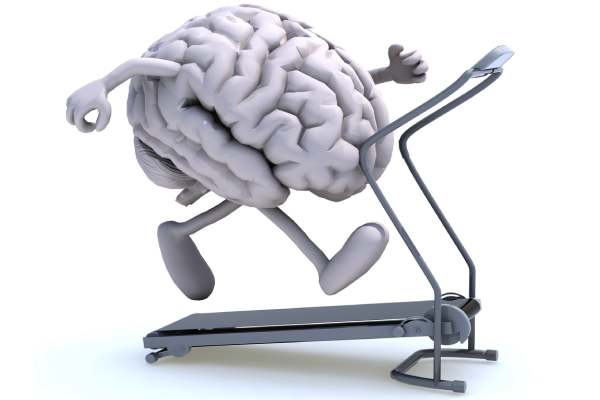Everyone want to be productive – there is no denying it. No matter what you do, no matter where you are, you want to be always at your best; on your A-game.
Who wouldn’t want to be working efficiently, being able to do the right things at the least possible time, and then having time to spare for things that you love doing? If you are still a student, you would give it all too, to be able to study smart while using your least resources to be able to pass an exam.
You would also want to have the best possible score for the effort you have exerted.
What Causes Memory Loss and Poor Concentration?

The brain is one of the most complex organs in the human body, and even though many scientists have conducted extensive studies to help them better understand exactly how the brain works, a lot still remains a mystery.
One particular aspect that causes scientists to frequently conduct experiments, studies, and clinical trials is the fact that a large number of people suffer from cognitive impairment[1]. In some cases, cognitive impairment may only cause mild symptoms, such as brain fog, but there are also cases where more serious mental impairment may become present.
In more serious cases, a person may experience severe memory loss, be unable to focus and concentrate, and might not be able to efficiently process information.
A variety of issues can contribute to poor concentration, memory loss, and other mental impairments. We would like to take a quick look at the numerous issues that have been associated with these particular symptoms:
Sleep Deficiency
Sleep serves a vital function in the body’s wellbeing, especially the brain. During sleep, the brain needs to conduct several processes that are essential for optimal functionality the next day.
WebMD[2] explains that when a person is unable to obtain a sufficient amount of sleep, they are likely to suffer from poor concentration, irritability and memory loss the next day. Continuous sleep deficiency has longer-term adverse effects to be concerned about as well.
Stress
While the majority of the worldwide population has a significant amount of stress to deal with, how a person deals with their stress has a considerable impact on how they are affected by the stress.
As stress piles up, a person becomes more susceptible to suffering from a variety of adverse effects that stress has on the body. The mind is especially prone to be affected by high levels of stress. These effects can cause memory loss, poor concentration, and many other problematic symptoms.
Depression
Depression causes feelings of sadness, demotivation, inadequacy and has also been linked to more serious problems, such as suicidal attempts. This mental illness also greatly affects the way we think[3] and process information.
In turn, depression may cause a variety of mental symptoms, including poor overall mental performance, memory loss and more.
Pharmaceutical Drugs
A large percentage of the general population needs to take certain prescription drugs on a daily basis. Additionally, a lot of people tend to rely on certain over-the-counter medication to counteract certain symptoms they may be experiencing.
Many of these drugs can have a significant amount of adverse effects on the human brain. Anti-anxiety medication, antidepressants, tranquilizers, sleeping pills, and many other drugs are known to cause confusion, memory loss and many other adverse effects related to mental performance.
Brain Diseases
Several brain diseases are known to also contribute to memory loss, poor mental health and many other adverse effects regarding the brain’s function and performance.
Alzheimer’s disease is one of the most well-known conditions that cause these particular symptoms, but there are some other diseases that may also have an adverse effect on cognitive function.
How to Improve Memory and Focus Without Pharmaceutical Drugs?

There are many ways in which a person can counteract the numerous adverse effects that they are experiencing regarding their overall mental performance.
The particular treatment option that will be administered to a patient will mostly depend on what may be causing them to experience these particular symptoms.
For example, when a person is diagnosed with Alzheimer’s disease, then adequate medication will be provided to the patient to help treat this condition.
Similarly, when depression is causing these problems, then the patient may be provided an antidepressant to help them fight back against depression and restore their mental function.
While certain diseases can be effectively treated with pharmaceutical drugs, there are many cases where a pharmaceutical approach to the symptoms a person is experiencing won’t be possible or necessary.
Taking drugs to help improve memory and concentration when lifestyle factors are causing these problems would only expose the body to potentially harmful chemicals – we want to protect our bodies and keep them as healthy as possible, not poison them with harmful chemically-formulated drugs.
There are numerous methods that can be utilized to improve mental performance and brain health without having to take any sort of pharmaceutical drugs.
The tips[4] we are going to share below primarily applies to conditions where the effects on memory and other mental-related factors are caused by reversible factors, and may not be useful at the same level when these particular symptoms are caused by a disease that directly affects the brain.
Brain Exercises
The brain is considered to be a muscle, so it should be exercised just as you would exercise the other muscles in your body.
Brain exercises help you to learn new things, it gives your brain a good challenge and it helps you develop new skills. Furthermore, the effects of these brain exercises can be quite rewarding.
Physical Exercises
Apart from brain exercises, you should also take the time to perform physical exercises as well. These exercises can also be very beneficial for the mind, and will also contribute to a healthier heart and body.
When you exercise, important brain chemicals are boosted and chemicals that are released during stress are reduced significantly.
Get Enough Sleep
When you do not sleep enough, your brain suffers. Thus, make a point of gaining enough sleep every single night.
It is important not to get some sleep one night and then consider the next night’s sleep to make up for your lost sleep. Create a sleep schedule that allows you to gain seven to nine hours of sleep every night for the most benefits.

Stress Management Techniques
Stress is another factor that has a detrimental effect on mental health. For this reason, if your life is filled with a lot of stress, you need to make sure you practice some effective stress management techniques.
There are many things you can do to help you better manage your stress, such as meditation, deep breathing exercises and sometimes just taking some time off may also help.
How to Achieve it?
The key to having the said state would be having right attitude, proper focus and the correct amount of concentration. The three element, if combined correctly, could give you the sweetest blend of your desired outcome.
These, though, is easier said than done. Nowadays, there are a lot of stressors and distractions that impair one’s ability to have the ideal mental state where it will be at best.
If you are having the trouble of impaired concentration and focus, getting to the point that you are being unproductive and irritable, then you have come to the right place.
This article would at least try to give the eleven things everyone – especially you – must know to be able to sustain and achieve the desired state, or for the mean time improve your concentration and focus where you can get do things with your best foot forward.
The 11 Golden Rules
To give some insights on your improvement goal, here are the eleven rules (these are not exhaustive) that you should follow:
1. Establish a Game Plan

Always start with the end in mind. Plan for things that you want to happen and to achieve. There are a lot of things that can catch your attention and make you do something irrelevant. With a proper plan, you can get to avoid those and focus on the tasks and work at hand.
This does not only improve your concentration and focus level, but helps you develop an overall discipline as well.
This can help focus your thoughts on what you are doing instead of letting them float around. For starters, you may develop your weekly routine to follow. Having a planner would be deemed beneficial too.
2. Slow Things Down, Take a Rest
Being able to concentrate requires a great deal of mental prowess. As such, you should keep your brain functioning well by not stressing it out. Know when to give it a break. It is important to be calm to be able to think properly. The best source of brain rest I through either sleeping of taking a nap.
Having a sleep of 8 hours a day would be most ideal to have a well-functioning brain. Do not oversleep.
Oversleeping can cause you to get lazy, aside from it making you less productive since you have been spending your time getting the extra sleep you do not need instead of doing something worthwhile.
3. Food for Thought

What you eat affect your overall being. There is a variety of food that can stimulate brain waves, helping you to improve your concentration level. Whole grains, oily fish, blueberries, tomatoes, eggs, blackcurrants, pumpkin seeds, broccoli, sage, and nuts are some of the well known products that can help you boost your brain power and at the same time, giving you healthy, well balanced diet.
Remember to avoid overeating, as it causes your intestine to digest food longer than normal, causing you to feel sleepy and slouchy. Eating a light, healthy and hearty meal can prove to be beneficial in improving your concentration.
Staying hydrated is a factor to consider too. The brain is substantially made up by water, composed of up to 75%. Being dehydrated causes a lot of impact in the brain, like shrinkage and loss of memory.
4. Keep your Body Moving
Getting yourself involved physically can contribute to your mental capabilities. Doing aerobic exercise produces some positive effects on your brain. An exercise of at least 20 minutes can boost memory and processing functions.
Why? Exercise causes your heart to pump faster, which means it pumps more oxygen to the brain. The most ideal time to have your physical-brain exercise is during the day, so that it can spike up your brain activity and prepares yourself for all possible stressful situations during the day.
5. Know your Optimal Environment
Some people work better at a loud environment, most do in a quiet one. It is important to know places or environments where you get to concentrate properly. Commonly, there are place designated for working and studying such as your local or school library, student lounges or your very own private room.
Know your personal preference for it affects your ability to absorb knowledge and to concentrate as well. Commonly, environmental factors are the ones that determine how one can retain information. If you are not in a setting where you are at your best, you may lose your focus easily and in turn, would not be able to absorb gathered information and knowledge.
6. Notable Notes

When you have important things to do and is always in a rush, remember that taking down notes is really helpful. Why? Because taking down notes get you line up on things that you should do. It also helps you to focus as everything goes on without worrying on getting left behind.
Knowing what to do, setting the timeline for it give you a higher level of focus on the things you do. You can concentrate on the noted matter that you be focusing on without necessarily getting distracted with the burden of remembering what you should do itself.
7. Do Not Do Multi-Tasking
Multi-tasking is the worst enemy of focus and concentration. When you do multi-tasking you thought that you are getting the jobs done quickly compared to doing it one by one. If you thought that you’d be able to hit two birds in one stone, then you are evidently believing in a myth.
Doing two different or unrelated things brings toll to your brain activity and wears it easily off. Your brain gets easily exhausted since it goes to and from different tasks.
Doing such sacrifices your efficiency and effectiveness, and will eventually you will lose focus that you need in order to do more jobs. Worst is that you won’t be able to finish the work at hand if you get exhausted or commonly known as brain drained.
8. The Wonders of Meditation
Meditation has long been proven to do wonders in optimizing your focus and concentration. In fact, we need the proper level of concentration to be able to meditate. Meditating daily give you a concentration boost, focus, improved memory and better sleep.
Usually, people practice Zen meditation for at least 12 minutes a day for a favorable result. Meditation helps relieve too, the effect of blast stress and long term exposure to stressors.
Take note that despite blast stress having a short term, temporary effect on your focus level, it will be detrimental to you if it becomes chronic stress. It can shrink your brain in the long run and age prematurely.
9. The Need to Overcome Boredom
Some things are just boring for a few to bear. Most – if not all – have gone through some experience that they cannot just tolerate listening to something or they just got too sleepy and bored of something, or maybe you are not just into a topic.
If you need to overcome or make it through some temporary episodes of boredom, there are tricks that can help you improve your focus. Chewing gum are one of the most sought to things when it comes to killing boredom.
Since it involves chewing, it is believed to increase oxygen flow to the brain, helping you to focus more. Peppermint gives the same effect too. Timing is an essential too. You must know your natural biorhythm – which mean knowing when your mind works best.
10. Try Quick Fixes

If you are having a hard time focusing or concentrating, there are a lot of available hacks that can help you to give a temporary boost! If you are not into distracting noise, a common life saver to help you get to your desired concentration especially if you are studying or working on something is to use earplugs. One hack that was noted to be effective is to keep yourself a tally record every time your mind wanders.
You just simply have to divide the card in different sections of the day, depending on your choices, then each instance your mind wanders, you have to put a check mark on the space designated. Since you will be conscious of your constant mind wandering, you will soon find yourself getting more focused to avoid the issue.
Normally, since time is indicated, you will be able to determine when is the time you regularly experience those episodes of mind wandering, and then you can address the issue by adjusting your routine.
Learning to handle distractions to your advantage is one of the hacks too, called as the spider technique. It is being able to expect and handle unusual noises and distractions in your surroundings. That happening, your concentration will not be rattled once what you expected to happen do occur. It is an efficient way to boost concentration.
Did you hear about the five more rule already? If you haven’t, now is the perfect time to try it! It is the concept of boosting your focus when you feel like quitting. You will have to tell yourself to do 5 more items or extend to 5 more minutes. This too, boost your discipline, not only being a quick fix but will develop your habits in the long run.
Establish a working area that you will be able to focus better. The Common mistake of some is that they do their tasks in their bed for comfort.
Though it is not really negative to be comfortable, this gives your brain two different context that it normally does not process together – sleeping and working. This may impair your concentration as you will be giving your brain the sleep signal when in fact you want to focus on what you are doing.
11. Practice Makes Perfect
Remember that getting the right concentration requires will and discipline. Achieving the set level to be attained is not different from achieving anything. Do this in routine because as the saying goes, practice makes perfect.
You should remember that you have to work for it to achieve it. It may be difficult at first but having the end with your goal in mind, plus the proper routine, nothing will look difficult if you have the will do it.
Why You Need It?

Remember that the list is neither restrictive nor exhaustive. There is a lot more other things that can help you out on improving your concentration, some on a personal preference basis since each person has his or her unique traits and needs pertaining to the matter.
The 11 golden rules aim to be a jumpstart and a booster altogether for those who are aiming to be at their most productive state. From students to working individuals, this article could be of use. Improved concentration and focus cannot be only used in your daily tasks, it can also welfare your overall being and goal setting.
Your self-discipline will be developed and will be more determined about your goals in life, as well as the manner you want to achieve them. In all of this, remember that self-help would always be the key. What was stated above would only work if you really are determined to achieve your target, in here, being more concentrated and focused.
Conclusion
In this fast paced world most of us have a lot on their plates. Staying focused and concentrated can get difficult than it should be. This where articles like this enter the picture: to help you and give you the proper insights.
Getting the proper concentration level would help you in carrying out your daily task, efficiently and uninterrupted, which is ideal since getting to do tasks in the littlest time leaves you with sufficient moments to catch up and live life to the fullest.
Feature Image: www.istockphoto.com
In Post Image: www.istockphoto.com


 This article changed my life!
This article changed my life! This article was informative.
This article was informative. I have a medical question.
I have a medical question.
 This article contains incorrect information.
This article contains incorrect information. This article doesn’t have the information I’m looking for.
This article doesn’t have the information I’m looking for.